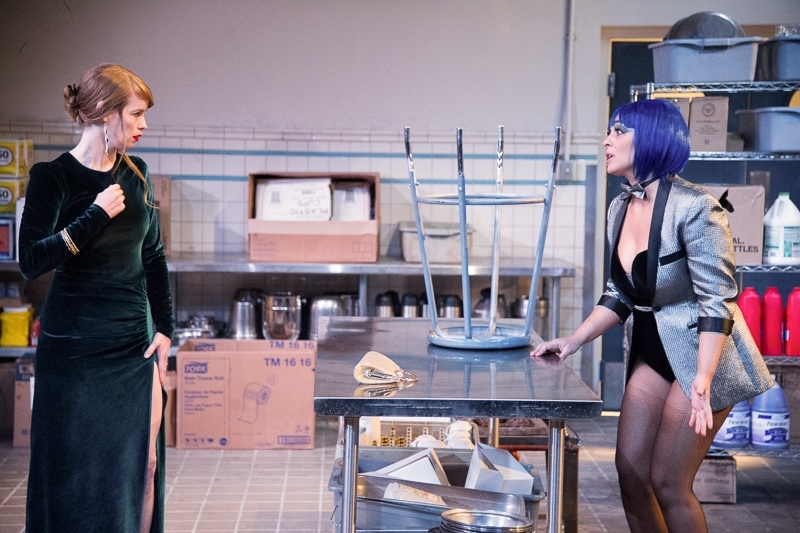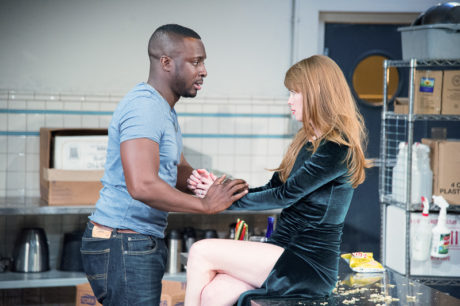Warning: Spoilers Ahead
Christy Escobar’s mesmerizing, compelling, utterly brilliant, performance is the centerpiece of Studio Theatre’s world premiere production of Hilary Bettis’ Queen of Basel. In Bettis’ reimagining of August Strindberg’s Miss Julie, Escobar inhabits Julie, the deeply troubled, wild, economically privileged and emotionally wrecked daughter of a wealthy, tyrannical Miami hotel and condo magnate.

The play occurs on a single night during Art Basel, a major Miami contemporary art festival where affluent people gather to competitively buy art, see and be seen, and party. Into the utilitarian setting of an auxiliary hotel kitchen – Debra Booth’s naturalistic set, full of metal shelves, miscellaneous boxes and crates, complete with a swinging door and fluorescent lights, captures the feeling of the place perfectly – stumbles Julie, distraught, angry, nearly incoherent, abandoned by her fiancé, smelling of gin that has spilled on her dress as the result of a collision with a cocktail waitress. The waitress, Christine (Dalia Davi), accompanies her, apologetic but caretaking, calmly controlled and pragmatic.
We immediately learn something about the two women from what they wear (Ivania Stack designed the costumes). Julie wears a long, elegant green party dress, slit up to the thigh, her sexuality a display of privilege. Christine is in a low-cut cocktail waitress outfit, her sexuality a commodity. Julie begins to interrogate Christine, as her entitled position allows her to do. We discover that Christine, whose ancestors escaped the Holocaust, is a recent refugee from Venezuela, working to bring her mother and daughter to safety from that country’s chaos.
Christine has called her Uber-driving boyfriend John (Andy Lucien) to take Julie home – Julie’s father wants no further embarrassment from her at the party. With Christine back at work, and John’s Honda having been towed, John and Julie are marooned in the kitchen. She begins to interrogate him as well. We learn that he is a smart, ambitious young man seeking to set up an HVAC business.
One of the things Bettis emphasizes is the diversity of the Latinx community. Julie, one-quarter Colombian, is physically and culturally white, speaking little Spanish. John is black, of Cuban/Haitian descent, predominantly English-speaking but understanding Spanish. For Christine, closer to white America’s idea of a typical Latina, English is an accented second language; she is just beginning to acclimatize to life in the U.S.
Christine is off stage for much of the play, working at the party (ML Dogg’s sound design allows the distant sounds of revelry filter in whenever she goes in or out the swinging doors), leaving John and Julie together. As John’s confidence increases, he reciprocates her questions with some of his own. They argue, they occasionally find surprising common ground. The dialogue goes to money (Julie’s relationship to money is terrifying), power, class, race, dreams pursued and thwarted, the nature of generosity, loyalty, and freedom. Bettis’ spectacular script is bursting with ideas, but the characters speak from the heart and from their pain; they do not deliver essays.
Lucien’s John is a vital, powerfully masculine figure. Julie’s antic energy is erotically magnetic. She is seductive, not just with her body but with her imagination, spinning a fantasy of a wine-infused, carefree life in Bogota. Lustful sparks fly.

José Zayas’ direction of the play uses silence and absence to speak eloquently about the characters and their states of mind and heart.
Escobar is an astonishing physical actor. As Julie’s volatile moods swing from one extreme to another, she flails her arms about, bends, displays her legs, throws her head back, rarely but tellingly is still for a moment. At one point, she almost literally climbs the walls, bleeds, physically manifesting her wounded soul. Her vocal range is just as great, dynamically and tonally, always true to character, bringing to a spoken role the passionate truth that someone like Maria Callas brought to opera.
Yet perhaps the most stunning moment belongs to Davi. Having secured her family’s flight to Miami through a means that may be a betrayal of Julie, Christine explains, in Spanish, the terrible events in Caracas that brought her to Florida. John hesitates to convey the full horror of the situation to Julie in English; she insists over and over that he translate. We can read in every morning’s Post about the “collapse of Venezuela.” This is what it feels like.
By play’s end, no one’s journey is complete. Each character leaves after a brief moment of improbable connectedness that has left them with a degree of hope, or at least thoughtfulness, about the course of their very different lives. For an audience, sharing such moments is what makes it worthwhile to attend theater.
[Read John Stoltenberg’s Magic Time! column about Queen of Basel.]
Running Time: One hour and 20 minutes, with no intermission.
Queen of Basel plays through April 7, 2019, at Studio Theatre, 1501 14th Street, NW, Washington DC. For tickets, call 202-332-3300 or go online.




